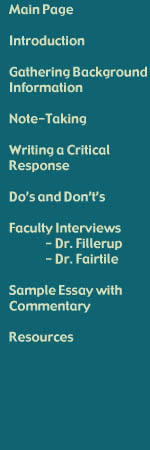

The Do's and Don't's of Writing in Music
Content by Lauren Oddo
Adapted for Web by Kelsey Shields
(printable version here)
"Music titles present all sorts of problems to students, probably because there are so many rules to apply. Which titles are italicized, and which get quotation marks? Why are some song titles listed in italics, but others aren't? What gets capitalized, and what doesn't?"
- Professor Fillerup, Department of Music
Dr. Fillerup's remarks expose the confusion many students feel as they begin to write within the music discipline. To be sure, music writing includes strict rules that may take time to get used to employing. However, style guides such as D. Kern Holoman's Writing About Music, which may be found at University of Richmond's Boatwright Library, include valuable tips to help you appropriately address musical texts. Therefore, following guides like Holoman's will inspire you to more confidently write your critical response essays. While style guides are a sure-fire way to remedy most mistakes in your music writing, Dr. Fillerup's Dos and Don'ts also provide an additional resource that will help you navigate the tricky rules that apply to music writing.
- Do capitalize most chronological periods of music history (the Renaissance, the Baroque, the Classical era, the Romantic piano). But don't capitalize "medieval" (the medieval motet).
- Don't capitalize genres (use opera, symphony, jazz-- not Opera, Symphony, Jazz). Remember this rule by thinking about genres in literature: you wouldn't capitalize Novel, Short Story, or Poem, either.
- Don't capitalize the names of instruments (use trumpet, piano, gong-- not Trumpet, Piano, Gong).
- Do use musical terminology when possible: "polyrhythm" instead of "two contrasting rhythmic patterns played at the same time."
- Don't rely on spell check to catch misspelled words in a music paper. Your computer program won't know that you meant to write "bass" (a low string instrument) instead of "base" (as in baseball), or that you anted "cymbal" (an instrument) instead of "symbol" (something that represents something else).
- Don't use vague descriptive words (like "intense" or "dramatic") to stand in for music terminology. Instead, ask yourself why the music sounds intense. Is it the use of dissonance? The unusually high range of the singer? The disjunct rhythmic patterns? identify the musical phenomena that make you think the music sounds intense, and write about those instead.
- Do learn which words in music mean something different that they do in everyday speech. For musicians, texture doesn't refer to something that might be rough or smooth, but to the relationship between melody and harmony. Low sounds are not necessarily soft sounds; they are simply low in terms of range (like a bass voice or a tuba).
- Do use the right word for the right type of music. Not all pieces of music can be described as songs, since a song typically has text (or lyrics). An instrumental composition might be called a piece or a work, but not a song. (There are always exceptions, of course: Felix Mendelssohn's Songs Without Words are untexted compositions for piano, but Mendelssohn still describes them as songs.)
Below is a short list of faculty pet peeves. For more in depth discussion, visit the professors' interview pages.
- Ascribing emotional content to music
- Calling every musical work a "song," regardless of its actual genre
- Confusing the roles of composer and conductor. Composers create, conductors perform.
- Using the past tense, rather than the literary present, when describing events in an opera or other musical narrative
- Labeling the words to a classical song "lyrics" instead of "text."
Back to Music Main Page
Other Disciplines | Writer's Web | Writing
Center | Make
an Appointment | Library
Copyright Info